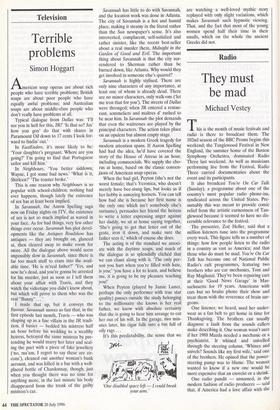Television
Terrible problems
Simon Hoggart Anerican soap operas are about rich people who have terrible problems; British soaps are about poor people who have equally awful problems; and Australian soaps are about middle-class people who don't really have problems at all.
Typical dialogue from Dallas was: 'I'll see you in hell for this, JR!' Is that so? Jes' how you gon' do that with shares in Paramount Oil down to 17 cents I look for- ward to findin' out.'
In EastEnders, it's more likely to be: Your daughter's pregnant. Where are you going?' I'm going to find that Portuguese sailor and kill him.'
In Neighbours, You better siddown, Wayne, I got some bad news.' What is it, Shirleen?"The toaster broke.'
This is one reason why Neighbours is so popular with school-children; nothing bad ever happens, though lately the existence of sex has at least been implied.
In Savannah, the Aaron Spelling saga now on Friday nights on ITV, the existence of sex is not so much implied as waved in your face. As for bad things, very few other things ever occur. Savannah has plot devel- opments like the Antiques Roadshow has antiques — they are brought on, glanced at, then cleared away to make room for more. All the dialogue above would seem impossibly slow in Savannah, since there is far too much stuff to cram into the avail- able time. 'He is m'real father?"Yes, and now he's dead, and you're gonna be arrested for his murder, just as soon as I tell them about your affair with Travis, and they watch the videotape you didn't know about, but which will prove to them who was the real "Bunny"...
I made that up, but it conveys the flavour. Savannah moves so fast that, in the first episode last month, Travis — who was shaping up as a fine villain in the JR tradi- tion, if busier — bedded his mistress half an hour before his wedding to a wealthy heiress, betrayed the same mistress by pre- tending he would marry her later and seal- ing the pact with a piece of fake jewellery ('no, ma'am, I regret to say these arc zir- cons'), cleaned out another woman's bank account, and was killed in a bar with a well- placed bottle of Chardonnay, though, just when you thought there was no time for anything more, in the last minute his body disappeared from the trunk of the guilty mistress's car.
Savannah has little to do with Savannah, and the location work was done in Atlanta. The city of Savannah is a hot and humid place, making it steamy in the literal rather than the Sun newspaper's sense. It's also introverted, complacent, self-satisfied and rather sinister, like the recent best-seller about a real murder there, Midnight in the Garden of Good and Evil. The important thing about Savannah is that the city sur- rendered to Sherman rather than be burned down, like Atlanta. Why would they get involved in someone else's quarrel?
Savannah is highly stylised. There are only nine characters of any importance, at least one of whom is already dead. There are no minor characters, only walk-ons (let me iron that for you'). The streets of Dallas were thronged; when JR entered a restau- rant, sommeliers and maltres d' rushed to be near him. In Savannah the plot demands that even the waitresses are played by the principal characters. The action takes place on an opulent but almost empty stage.
Savannah is a modern Greek tragedy for modern attention spans. If Aaron Spelling had had the idea, he'd have covered the story of the House of Atreus in an hour, including commercials. We supply the cho- rus at home, based on the classic conven- tions of American soap operas.
When the bad girl, Peyton (she's not the worst female; that's Veronica, who doesn't merely have bee-stung lips, but looks as if her hobby is annoying hornets. You can tell how bad she is because her first name is the only one which isn't somebody else's surname), persuades her friend the heiress to write a letter expressing anger against her daddy, we sit at home saying together, `She's going to get that letter out of the grate, iron it down, and make sure the father sees it,' which of course she does.
The acting is of the standard we associ- ate with the daytime soaps, and much of the dialogue is so splendidly cliched that we can chant along with it. 'The only per- son you hurt when you're filled with hate, is you;"you have a lot to learn, and believe me, it is going to be my pleasure teaching you!'
When Peyton (played by Jamie Luner, perhaps the only performer with true star quality) pauses outside the study belonging to the millionaire she knows is her real father, we know with absolute certainty that she is going to hear him arrange to cut her out of his will. In the garage, two min- utes later, his cigar falls into a bin full of oily rags .. , It's this predictability, the sense that we 'One disabled space left — I could break your arm.' are watching a well-loved mythic story replayed with only slight variations, which makes Savannah such hypnotic viewing. That, and the fact that most of the young women spend half their time in their smalls, which on the whole the ancient Greeks did not.


























































 Previous page
Previous page